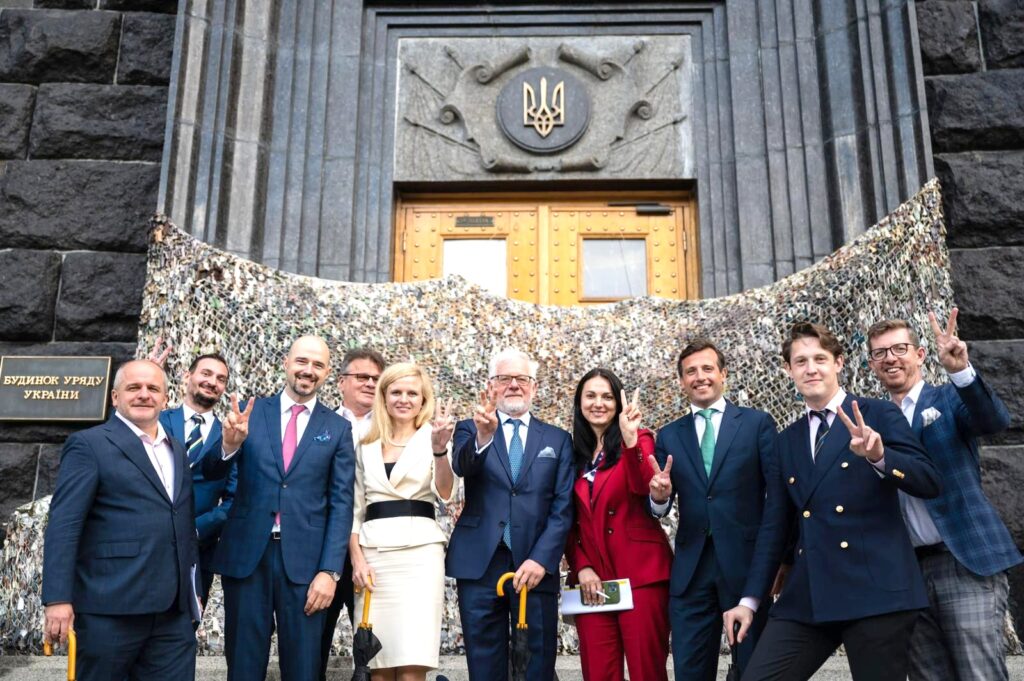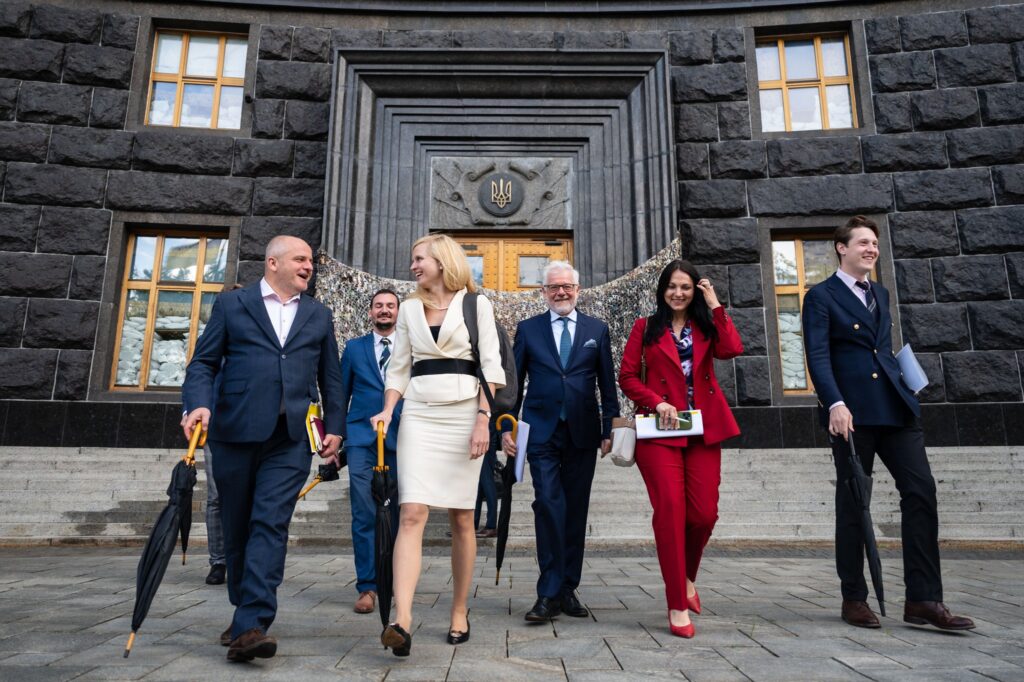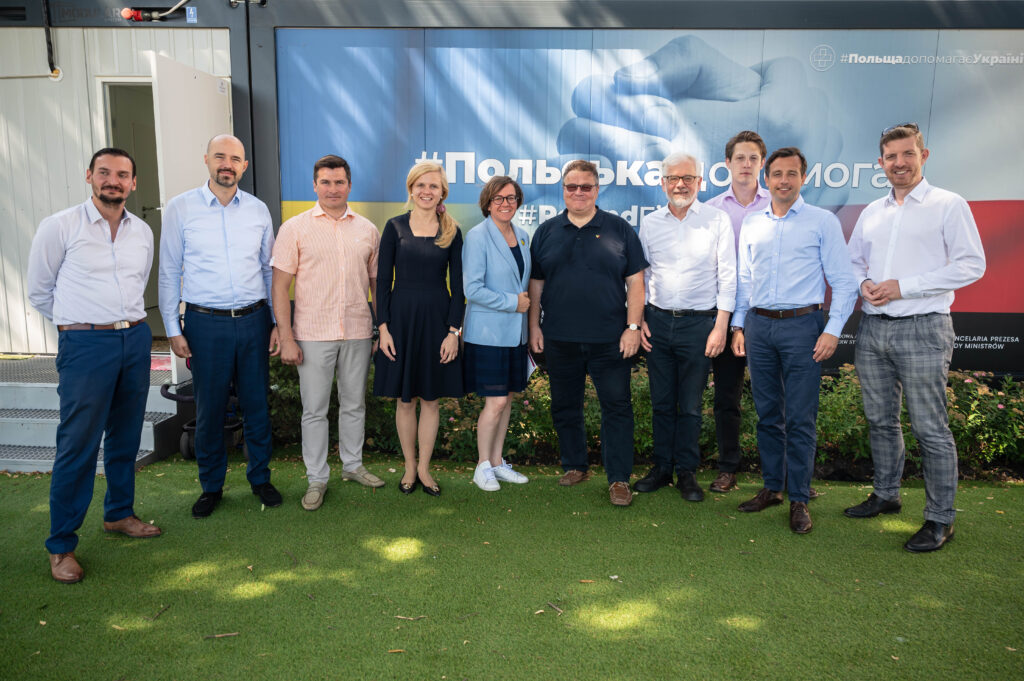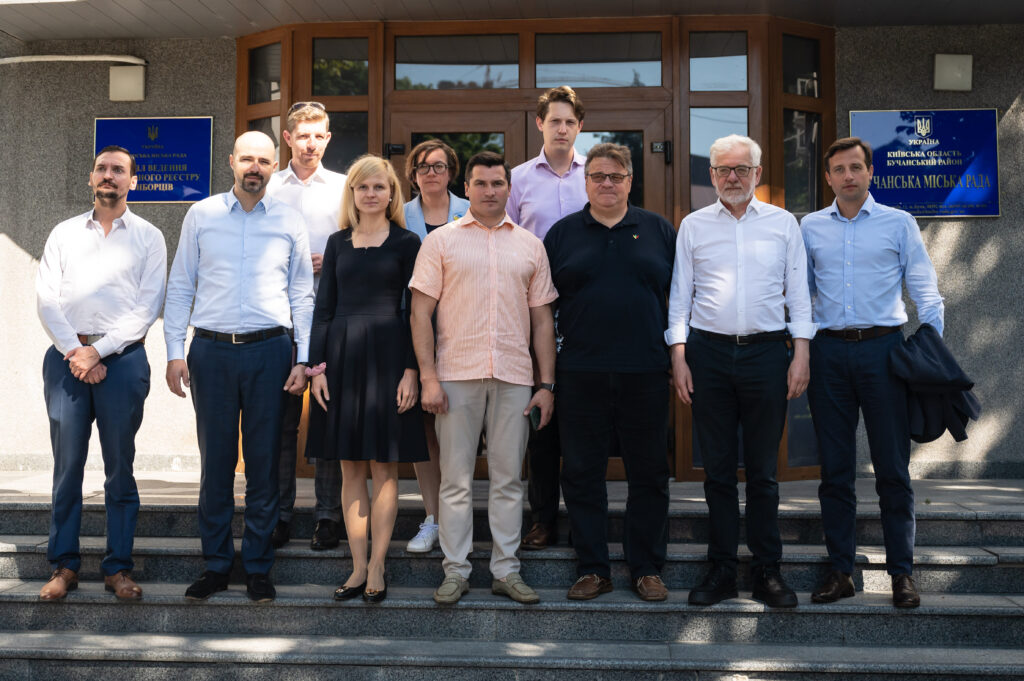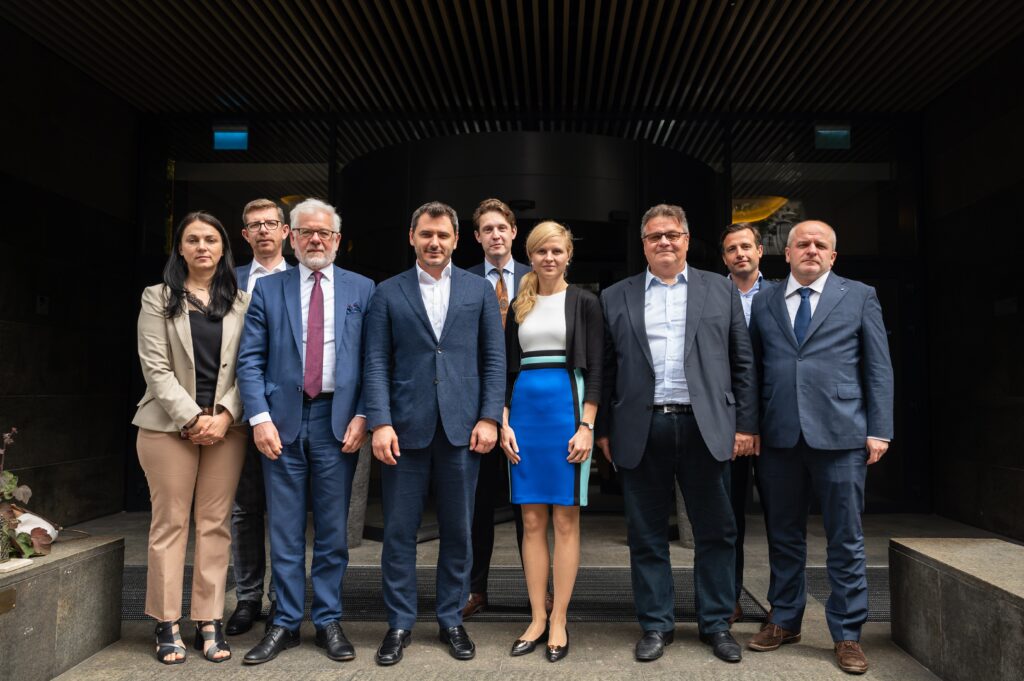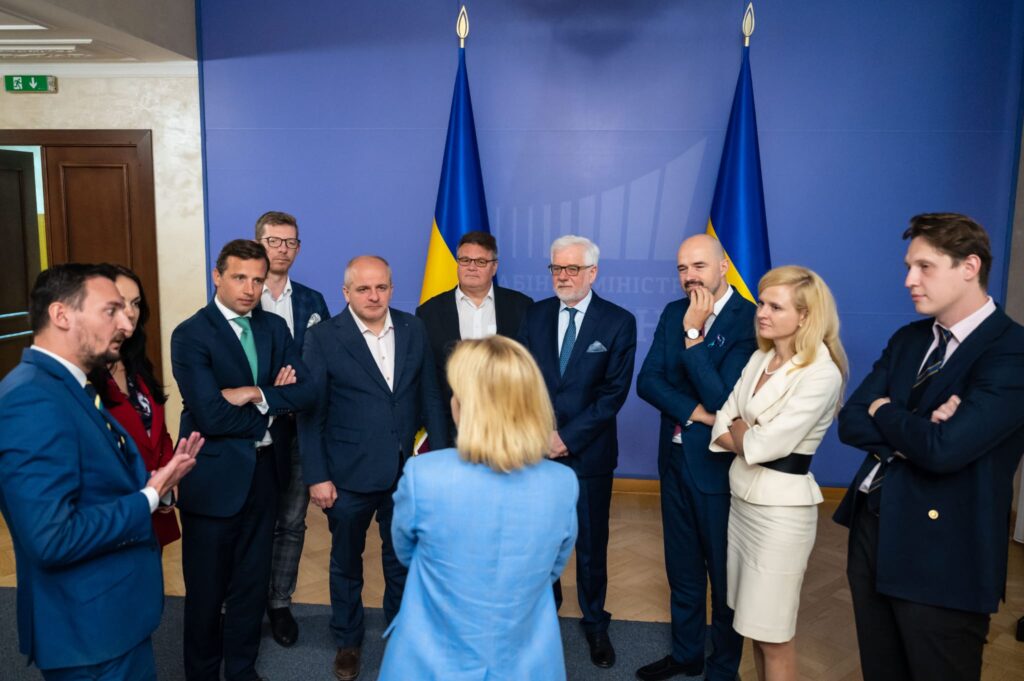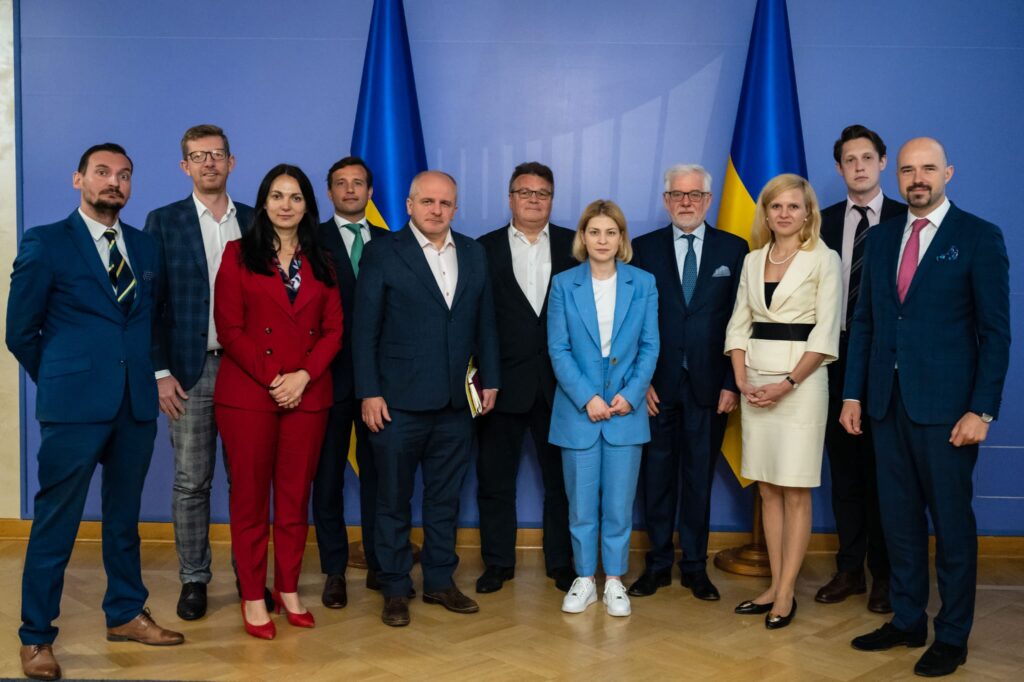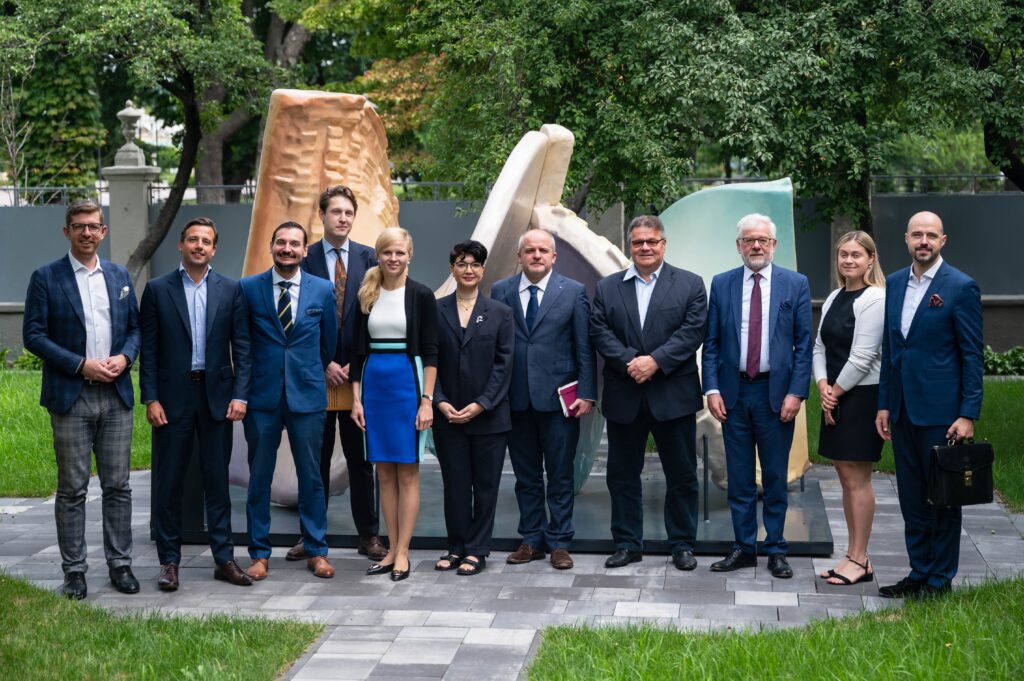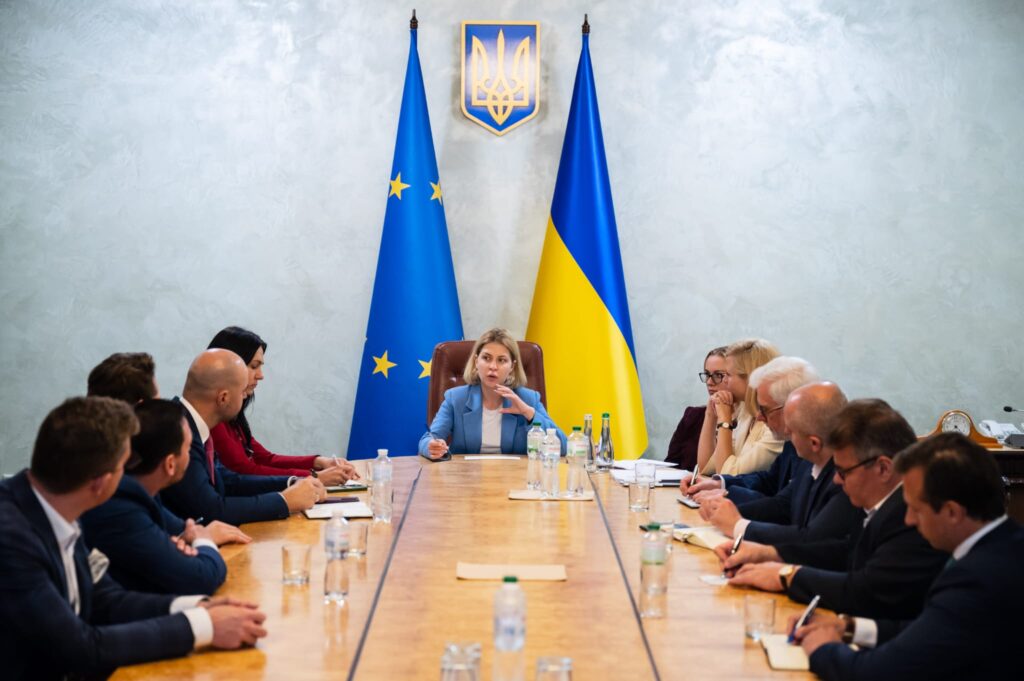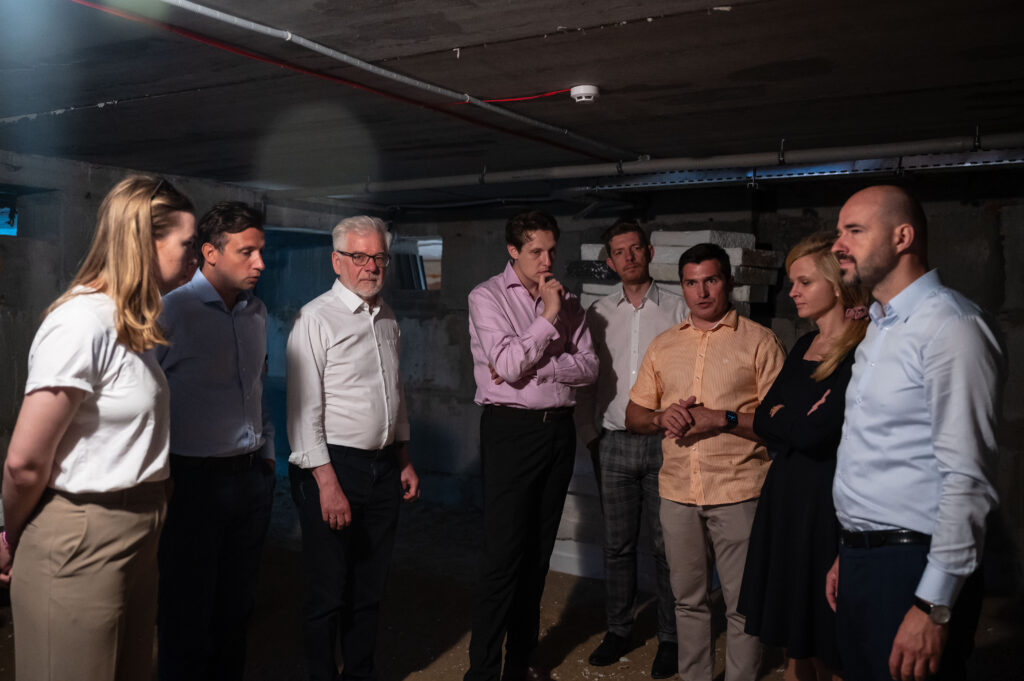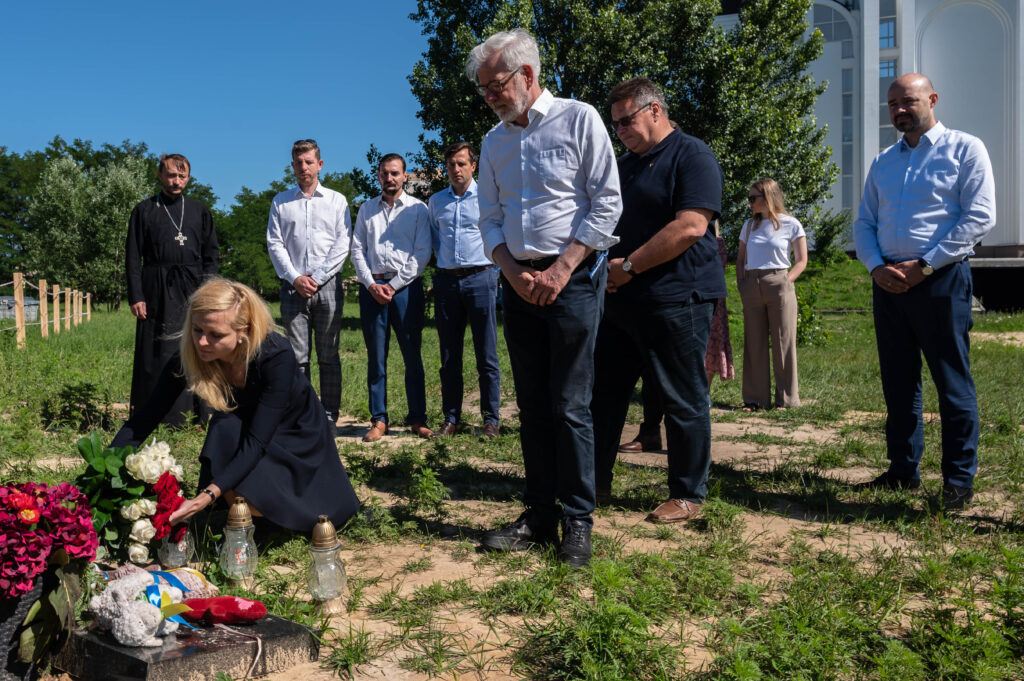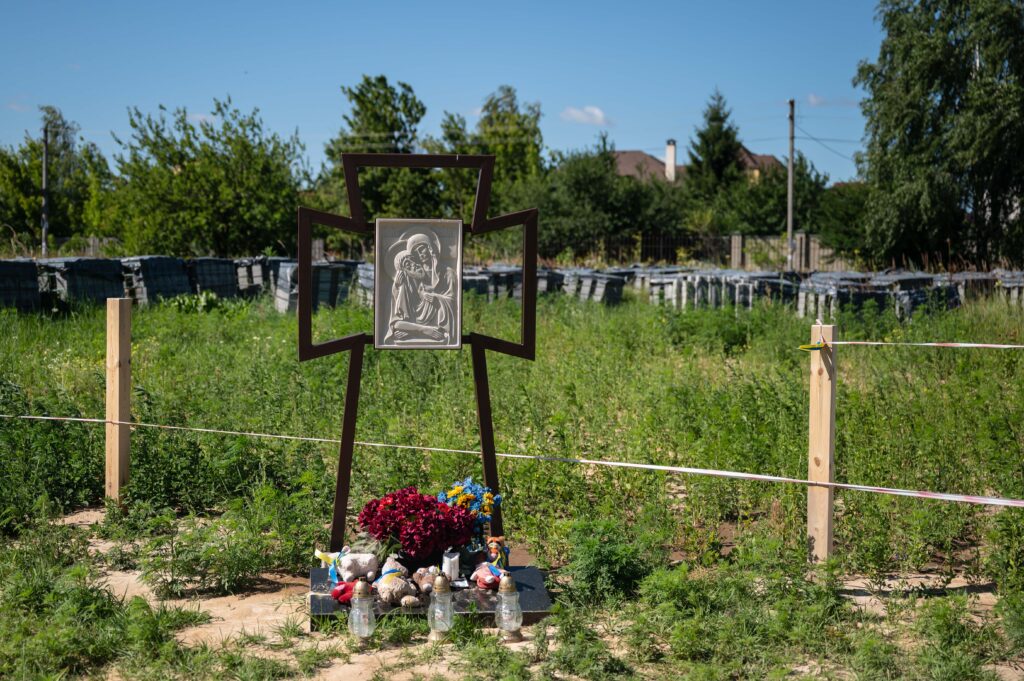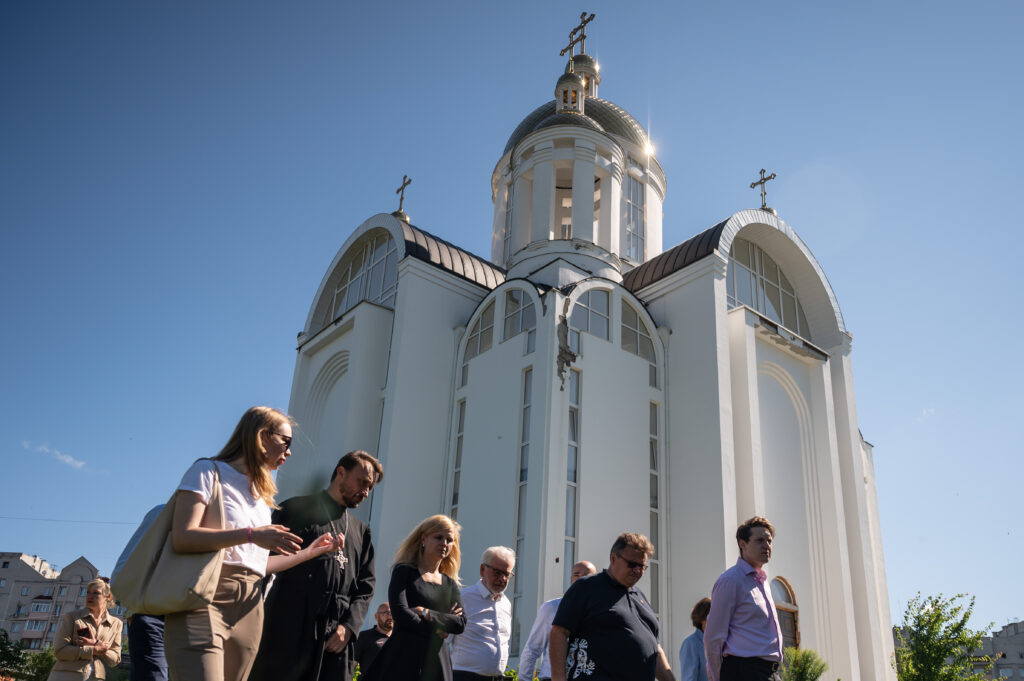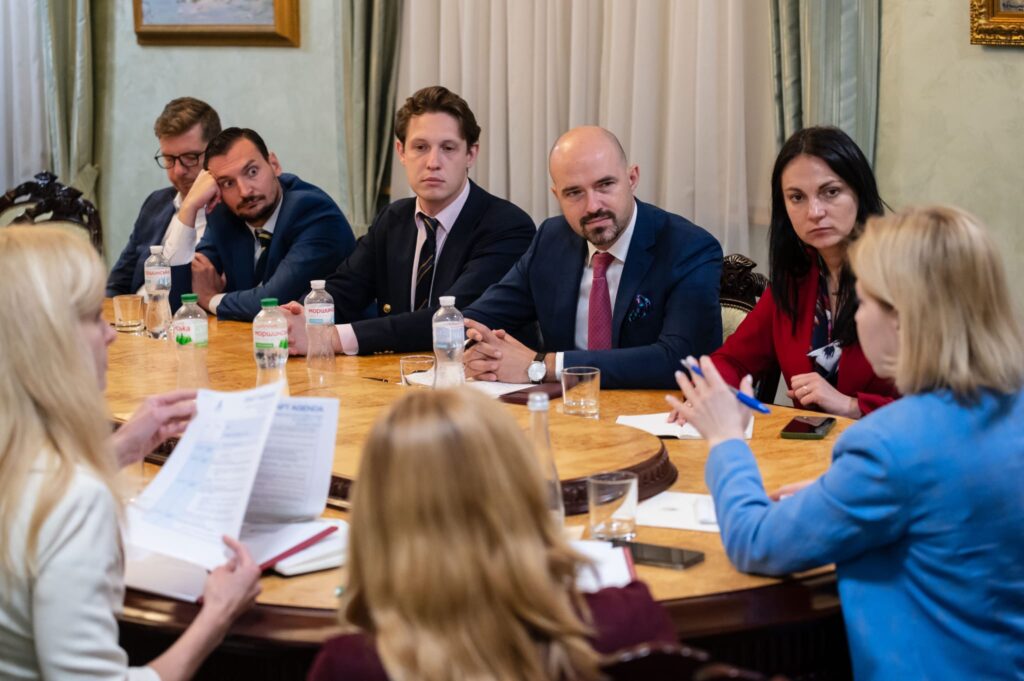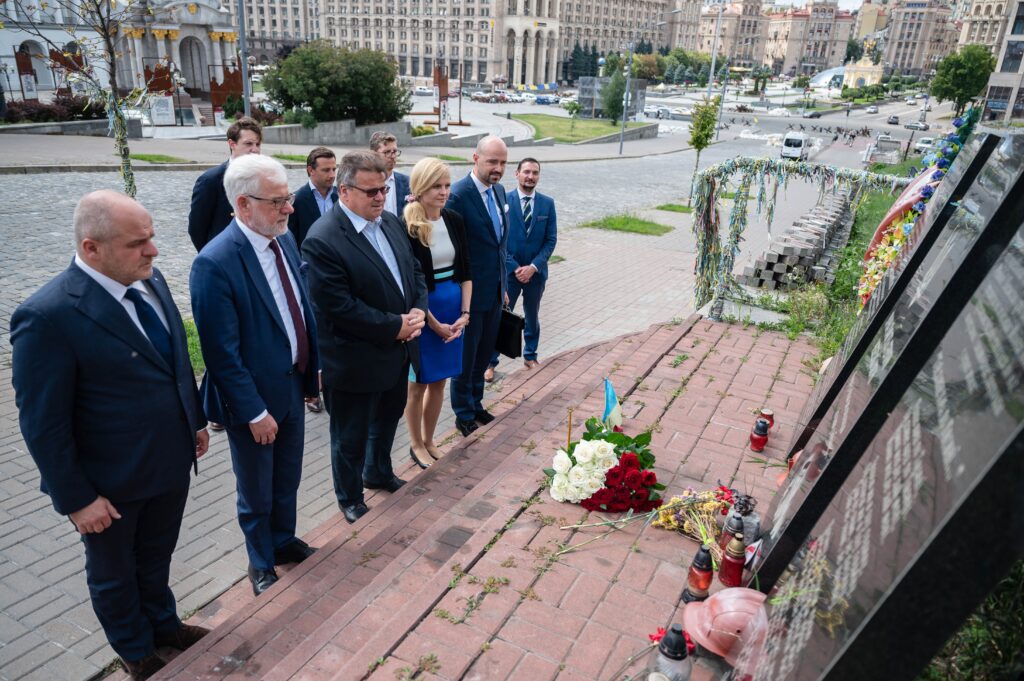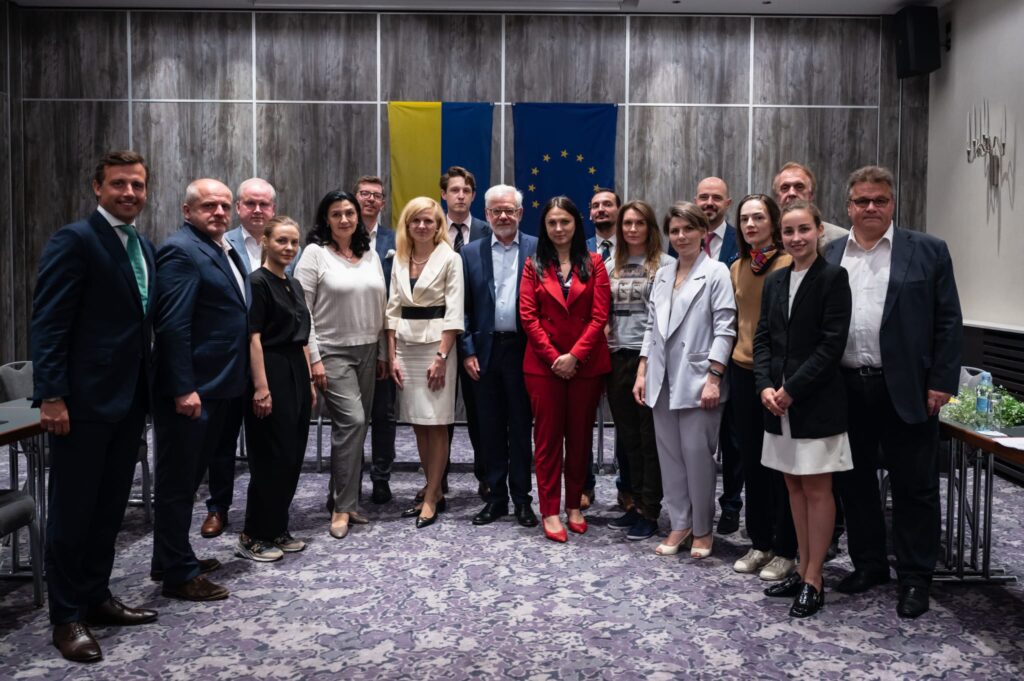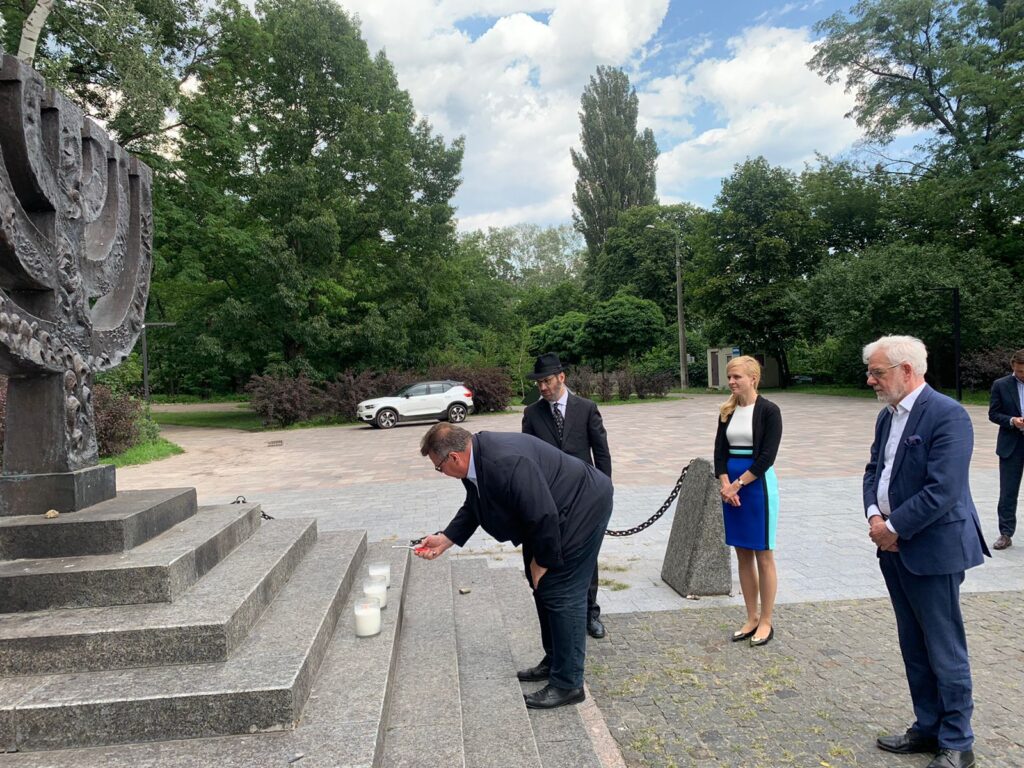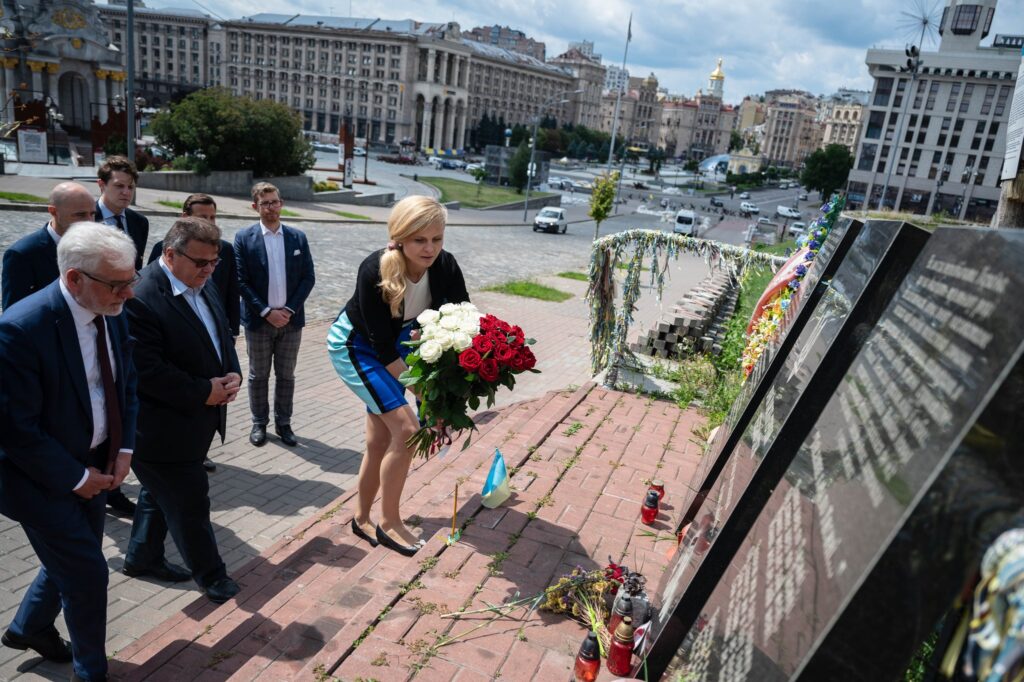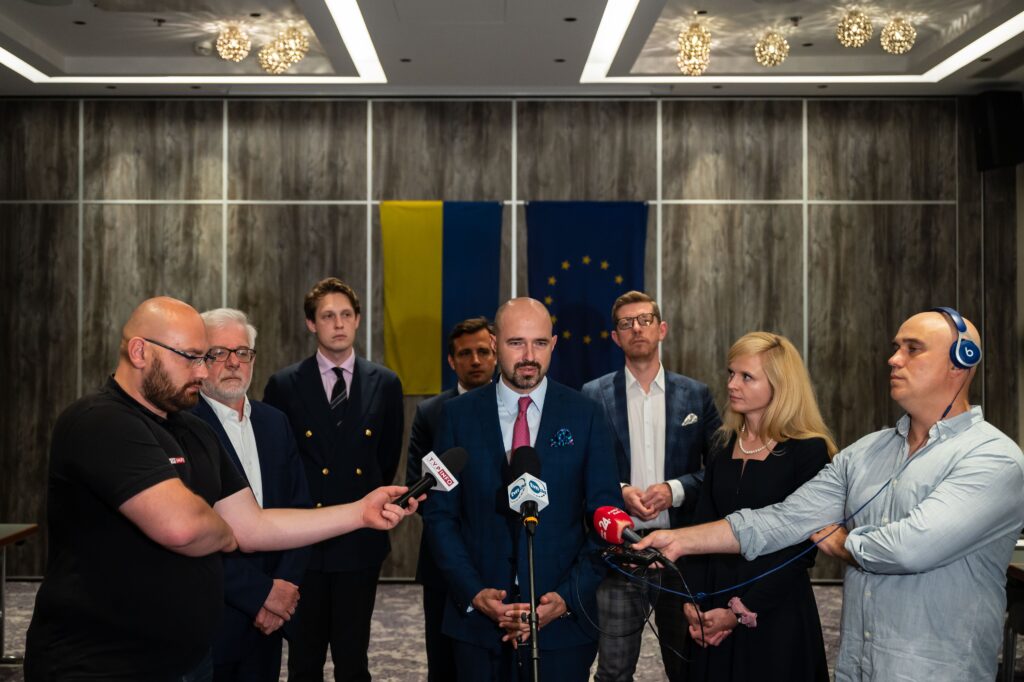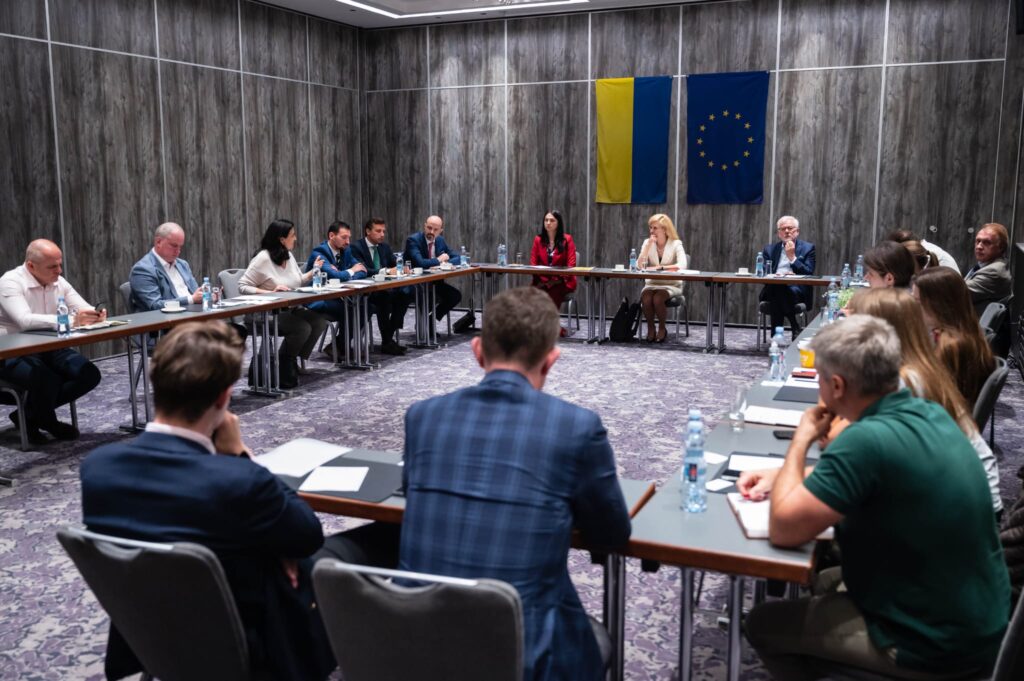The Leaders of the Casimir Pulaski Foundation and the Warsaw Security Forum visit Kyiv to promote strengthened international support for Ukraine
Coordination of international efforts for close integration of Ukraine with the European Union, increased military assistance of NATO countries, and financing of post-war reconstruction of Ukraine were the main goals of the visit of the representatives of the Casimir Pulaski Foundation in Kyiv. The delegation, which included the Foundation’s Management and representatives of the International Advisory Board of the Warsaw Security Forum, was in Kyiv from 19 to 21 July.
VISIT TO KYIV
During the three-day visit of the Foundation’s representatives, Vice-Chairman of the Parliamentary Foreign Affairs Committee Paweł Kowal and former Ministers of Foreign Affairs of Poland – Jacek Czaputowicz and Lithuania – Linas Linkevičius met with, among others, Deputy Prime Minister of Ukraine Olha Stefanishyna, ministers responsible for the country’s defence, as well as parliamentarians of various parties sitting in the committees of foreign affairs, European integration or national defence. During the meetings, the key needs of Ukraine were discussed from the point of view of the current war situation, Kyiv’s international position and the medium- and long-term plans for the reconstruction of the war-stricken country and its integration into the structures of the European Union and NATO.
The visit is part of our strategy of multidimensional support for Ukraine on the international arena initiated by the Pulaski Foundation in the first days of the war with Russia with the establishment of the International Centre for Ukrainian Victory in Warsaw, Katarzyna Pisarska, Chairman of the Board of the Pulaski Foundation emphasized. In order to win this war, Ukraine needs extensive and continuous military and financial support. Our role as the Pulaski Foundation and the Warsaw Security Forum is to strengthen this awareness in the countries of Europe and the Transatlantic Community. It is also important to prevent the growing sense of war fatigue sometimes felt among our Western partners. We work on behalf of Ukraine in many fields: as a think-tank, we prepare professional analyses to help Western politicians make decisions on how to support Kyiv. We are active in advocating for Ukraine’s postulates in allied capitals. Every day we remind Western communities that the security of the whole of Europe is at stake in this war. During the Warsaw Security Forum, we will thank the people of Ukraine for their struggle and sacrifice by awarding them the title of the ‘Knight of Freedom’.
During the meeting with the Deputy Prime Minister for European and Euro-Atlantic Integration – Olha Stefanishyna – issues of preparation for Ukraine’s future accession negotiations with the EU were raised. Current arms needs and the situation on the frontline were discussed with representatives of the Foreign Affairs Committee, the European Integration Committee and the National Defence Committee.
The delegation also met with Tamila Tasheva – the presidential representative in the Autonomous Republic of Crimea, to discuss the situation on the territory of the peninsula occupied by Russia since 2014 and the current problems of the population there.
In a conversation with the parliamentary representative Yegorem Cherniev, who serves as Chairman of the Delegation of the NATO Parliamentary Assembly, the issues of integration of the Ukrainian Armed Forces into the structures of the North Atlantic Alliance and current armament needs were discussed.
Representatives of the Foundation and the International Advisory Board of the Warsaw Security Forum were also received by the representatives of the Mayor of Kyiv, Vitaly Klitschko, who discussed the challenges of managing the city during the war and outlined the scale of destruction wrought by Russian aggressors. They also emphasized the role of the support coming from Poland – including the capital city of Warsaw.
The Deputy Minister for Infrastructure, Mustafa Nayem, pointed to Ukraine’s infrastructure as an important element of logistical support, including arms supplies during the ongoing war, while in the meeting with the Minister of Development of Municipalities and Territories of Ukraine, Oleksiy Chernyshov, attention was drawn to the massive damage to both critical infrastructure and residential buildings, schools or hospitals, but above all to securing energy supplies to households. It was also stressed that Ukraine’s focus is now on winning the war, which will be followed by a planning phase for a wide-ranging reconstruction plan for the country.
The delegation was also received by the Polish Ambassador to Ukraine, Bartosz Cichocki, who was the only representative of the diplomatic corps accredited in Kyiv who did not leave his post after the outbreak of war. Ambassadors Yagmur Ahmet Guldere of Turkey, Darhan Amanuly Kaletaev of Kazakhstan, Ayman Ahmed Mokhtar Elgammal of Egypt and Charge d’Affaires of Canada, Ms Nicola Kim, also participated in the discussion on the international situation surrounding Ukraine.
TRIBUTE TO THE VICTIMS OF WAR CRIMES
An important element of the visit to Ukraine was the Delegation’s arrival in Bucha, the symbol of Russian barbarism. The local authorities, together with the priest of St Andrew’s parish, spoke about the crimes during the Russian occupation of the town, and the deeply moved members of the Delegation laid flowers at the site of the temporary grave of the victims. Flower wreaths were also laid on the Maidan at the Monument of the Nebesna Sotnia Heroes and at Babin Yar, the site of the holocaust on which Russian rockets fell in the first week of the war.
A member of the delegation and the International Advisory Board of the Warsaw Security Forum, former Lithuanian Minister of Foreign Affairs and Defence, Linas Linkevičius: It is our job to touch, see and feel, and then to tell what we have seen and spread the message in Western Europe to build a coalition of support for Ukraine. It is important to prevent fatigue, discouragement with the war in the West. Our task is to provide sustainable and focused support for Ukraine, for the country’s short and long-term needs.
INTERNATIONAL CENTRE FOR UKRAINIAN VICTORY
The Casimir Pulaski Foundation’s efforts to build international support for Ukraine’s war effort and its rapid integration into EU and NATO structures have been ongoing since the first day of the Russian invasion. Already in the first hours of the war, the Foundation evacuated endangered activists from Ukrainian NGOs to Poland, creating conditions for them to work and actively build a coalition of Ukraine’s allies. On March 4th this year, the International Centre for Ukrainian Victory (ICUV) was launched in Warsaw, a platform bringing together dozens of Ukrainian and Polish activists to support efforts to strengthen Ukraine’s defense and its democratic future.
The activists of the ICUV initiative, which operates under the umbrella of the Pulaski Foundation, have had many meetings with politicians from all over the world (including the British Prime Minister Boris Johnson, the head of US diplomacy Anthony Blinken, as well as representatives of the Polish Sejm and Senate, the US Congress and the German Bundestag). Every week, the Centre’s representatives organize meetings in Western Europe and across the Atlantic, through which they demonstrate to those concerned the enormity of the tragedy of the war caused by the Russian Federation, the suffering and heroism of ordinary citizens and the need for concrete support for their efforts (e.g. supply of weapons), which should translate into the victory for Ukraine in the fight for its independence and a secure future. An example of this is the Ukrainian Recovery Conference, held in Lugano, Switzerland, in which ICUV’s Hanna Hopko or the Centre’s co-founder Olga Aivazovska took an active part, delivering a speech at the Washington headquarters of the Helsinki Commission.
“There is not a more important issue in Europe today, in the world of the democratic West, than the victory of Ukraine over aggressive Russia. At this historic moment, the full mobilization of the entire international community is needed. Our organization is relentless in its efforts to achieve and strengthen this mobilization. Thanks to the involvement of the Pulaski Foundation, we are able to act effectively all over the world,” – Hanna Hopko, leader of the International Centre for Ukrainian Victory (ICUV), member of the WSF International Advisory Board, former Chair of the Foreign Affairs Committee of the Ukrainian Parliament emphasized.
UKRAINE ON THE ROAD TO THE EUROPEAN UNION
The theme of Ukraine’s accession to the European Union ran through all the talks in Kyiv. It is the joint opinion of all members of the delegation that these efforts should be supported wholeheartedly.
I see an immense mobilization on the Ukrainian side for talks with the EU and I believe that immediately after the end of the war Ukraine will become a member of the European Union, Jacek Czaputowicz, a member of the WSF International Advisory Board and former Minister of Foreign Affairs of Poland emphasized.
The Pulaski Foundation, together with its partners, declares far-reaching support in Ukraine’s accession efforts. One of the key areas of development that should be considered is, among others, professional education of the current and future civil service personnel, prepared to perform their duties in the realities of Ukraine’s membership in Western structures. In her talks with representatives of the delegation, Ukraine’s Deputy Prime Minister Olha Stefanishyna paid particular attention to this area.
Zbigniew Pisarski, Chairman of the Board of the Kazimierz Pulaski Foundation, Member of the Council of the European Academy of Diplomacy: “In the perspective of the fast and ambitious path of accession that Ukraine wants to take, the experience of the Polish way to the West and membership in the EU and NATO, collected by our experts for almost two decades, can be a significant added value. We express our full support for the idea of Ukraine in the European Union and we are in advanced talks on opening a Foundation office in Kyiv. We believe that this initiative will significantly contribute to the intensification of bilateral cooperation and effective exchange of experience” – he stressed.
MOBILIZATION NEEDED
For more than 150 days, Ukraine has been heroically defending itself against the invasion of Russian forces. Russia’s attempt to forcibly shift its borders has clearly demonstrated that it remains the most serious threat to peace and security in Europe. The achievement of the Kremlin’s stated political objectives is being carried out in violation of all norms of international law. Since the beginning of the invasion, Russian soldiers have committed numerous war crimes, the victims of which have been civilians. The passing of time, however, is changing the optics of Western societies on the ongoing conflict, which requires the continued mobilization of global public opinion in an effort to support Ukraine and remind them of the hell of war caused by Russia.
The Foundation’s key tool for shaping international opinion in a spirit of solidarity with Ukraine is the Warsaw Security Forum. The topics of the next edition of the Warsaw Security Forum, which the Casimir Pulaski Foundation is organizing together with the American organization GMF on October 4th and 5th this year, will reflect the new reality after February 24th. The Forum will be a platform for discussion in the areas of geopolitics of the Central and Eastern European region and transatlantic relations, as well as defense, energy and climate security and the resilience of modern democracies in light of the war unleashed by Russia in Ukraine.
During the conference, the People of Ukraine, for their stoutheartedness, will be honored with the Knight of Freedom Award, which is presented by the Casimir Pulaski Foundation to outstanding figures who fight for freedom, justice and democracy.
This year’s edition of the Warsaw Security Forum will be attended, among others, by the foreign and defense ministers of Germany, Finland, Ukraine, Great Britain or Latvia, who, in the course of their discussions, will analyze the causes of the aggression and how to bring an end to it. They will also formulate specific conclusions and recommendations for action. The main objective of this year’s edition of the Warsaw Security Forum is to work out solutions beneficial for Ukraine both in its support in the fight against the aggressor and in the post-war reconstruction of the country and its road to full-fledged membership in international structures, including the European Union.
SHARE THIS STORY ANYWHERE YOU LIKE
SHARE THIS STORY ANYWHERE
NATO Summit side-event: WSF closed door dinner
On July 9th, 2024, the Warsaw Security Forum held an official side-event to the NATO Summit in Washington D.C - a high-level dinner entitled. “Programming for the Upcoming Challenges: Vision for NATO & Transatlantic Security 2024 & Beyond.”
Republic of Poland-Republic of South Korea Strategic Dialogue
On June 21, 2024, the Pulaski Foundation organised a High-level Strategic Dialogue between the Polish and South Korean ministries of defence. The talks were attended by Poland’s Deputy Prime Minister and Minister of National Defence Władysław Kosiniak-Kamysz.
Annual Warsaw Security Forum Ambassadors’ Meeting
On June 11th, The Warsaw Security Forum held it's Annual Warsaw Security Forum Ambassadors’ Meeting. The event welcomed over 25 Ambassadors of the EU, NATO and Partner states.
